by Kathrine Grant & Dr. Fatma Selampinar
UConn Early College Experience collaborated with Chemistry Faculty Coordinator Dr. Fatma Selampinar (UConn ECE) and other department faculty to host two Science Activity Days at UConn Storrs. On April 25 and May 17, UConn opened its doors to over 100 high school students from The Woodstock Academy and Berlin, 0. H. Platt, Daniel Hand, and Watertown High Schools for a day of science lectures, demonstrations, and hands-on laboratory activities.
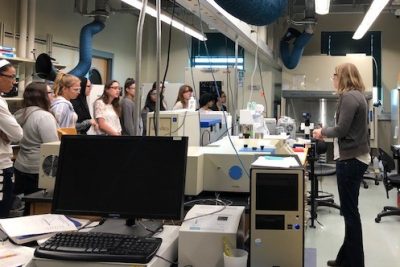 The April 25th Science Activity Day was coordinated by the UConn Early College Experience Program Office and Dr. Selampinar, with science activities hosted by Dr. Rouge and Dr. Ung and their graduate students (Alyssa H., Saketh G., Mark T., Kaitlynn A., Erin B., Nishya M., and Rebecca F.). To kick off the day's events, the high school students learned about how an interest in chemistry can prepare them for a variety of job paths, including working in a lab as a researcher someday. In the afternoon the students broke into two sections to learn about molecules that can fluorescence and about biomacromolecules that can build structures at the nanoscale. During Dr. Ung's activities, students were taught an overview of the principles of fluorescence and how light interacts with molecules. They made glow sticks and were exposed to scientific thinking. The students were asked to determine why molecules glowed and made simple hypotheses that they verified experimentally. Later, the students gathered and shared the results of their experiments to conclude the relationship between chemical structure and a molecule's ability to glow.
The April 25th Science Activity Day was coordinated by the UConn Early College Experience Program Office and Dr. Selampinar, with science activities hosted by Dr. Rouge and Dr. Ung and their graduate students (Alyssa H., Saketh G., Mark T., Kaitlynn A., Erin B., Nishya M., and Rebecca F.). To kick off the day's events, the high school students learned about how an interest in chemistry can prepare them for a variety of job paths, including working in a lab as a researcher someday. In the afternoon the students broke into two sections to learn about molecules that can fluorescence and about biomacromolecules that can build structures at the nanoscale. During Dr. Ung's activities, students were taught an overview of the principles of fluorescence and how light interacts with molecules. They made glow sticks and were exposed to scientific thinking. The students were asked to determine why molecules glowed and made simple hypotheses that they verified experimentally. Later, the students gathered and shared the results of their experiments to conclude the relationship between chemical structure and a molecule's ability to glow.
During Dr. Rouge's lab activities, students learned about how polar charged molecules interact differently with DNA than hydrophobic molecules and that hydrophobic dyes can be chemically tailored to dock into DNA for tracking in a variety of applications. After learning the basic properties of DNA, the students were asked to predict what would happen to DNA when subjected to various conditions, including when DNA is assembled on a nanoparticle. At the end of the activity students were able to interpret their own data and compare their results to other groups.
The May 17 Science Activity Day was also coordinated by the UConn ECE Program Office and Dr. Selampinar, with science activities hosted by Dr. Adamson, Dr. Kumar, Dr. Lin, and Dr. Zhao and their students (Megan P., Ankarao K., Jean B., Mansi M., Stephen K., Arlene B., Elizabeth B., Prabodha A. and Deepthi V). The morning started with the presentations given by Dr. Adamson, Dr. Benson, and Dr. Lin. After a series of presentations, the students broke into four sections in which they learned about nanoparticles. In Dr. Kumar's workshop on nanomaterials, the lab group presented the synthesis of protein-based nanoparticles and the use of dynamic light scattering to determine their sizes. The students were able to discover and learn about how nanoparticles are formed, how they are characterized, and the possible uses of nanomaterials as opposed to bulk materials.
Drs. Lin and Zhao's activities involved synthesizing gold nanoparticles and testing the nanoparticles obtained to see whether their color changes when salt or sugar is added to the solution. In this experiment, students learned that noble metal nanoparticles exhibit unique optical properties compared to the bulk material. In other words, the color of the nanoparticles are different from the bulk. For example, a solution of gold nanoparticles may look red instead of yellow. The students were also able to visualize individual gold nanoparticles with a state-of-the-art optical microscope.
Dr. Adamson's activities involved methods for exfoliating ( or unstacking) both graphite and boron nitride without resorting to harsh chemical treatments or added stabilizers. In this experiment, two-dimensional sheets, each a single atom thick, are stacked up like a deck of cards to form materials such as graphite and boron nitride. Unstacking these decks of cards is difficult but would provide very high surface area materials with uses as conductive transparent films or nano-fillers for polymer composites. Students learned about how these processes rely on an interfacial kinetic trapping technique that takes advantage of mismatches in solvent surface tensions and results in a dramatic climbing phenomenon of single sheets of material on glass slides.
Since the Chemistry Department and UConn ECE started hosting these Science Days filled with handson activities, demonstrations, and lectures, the interest from high schools and high school students has increased. These kinds of activities spark the students' interest in chemistry as they are seeing the real face of chemistry in a laboratory setting as well as learning what it means to study the subject at the collegiate level. After beginning these Days, the department has begun receiving e-mails from students interested in doing research in a lab over the summer or in joining a research group when they come to UConn.
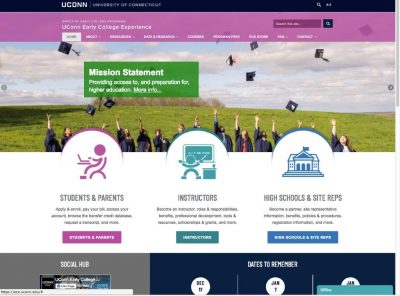
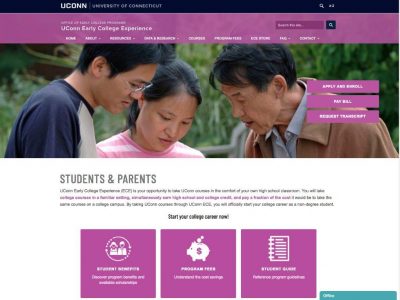
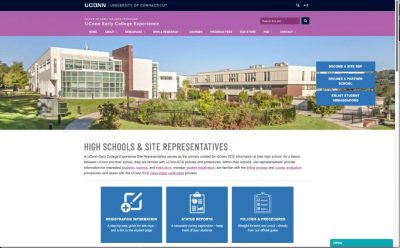
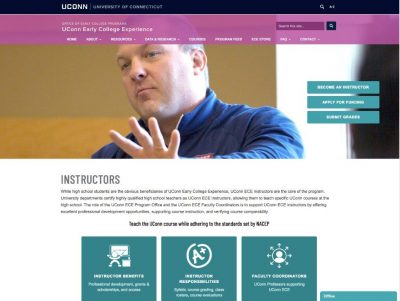
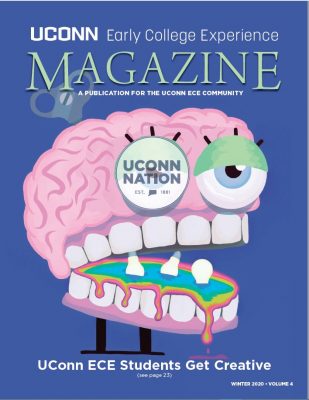
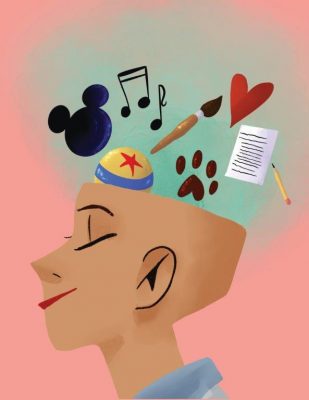

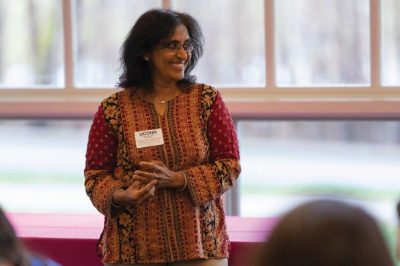
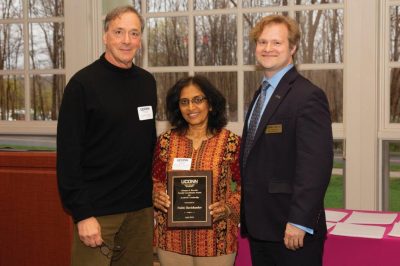
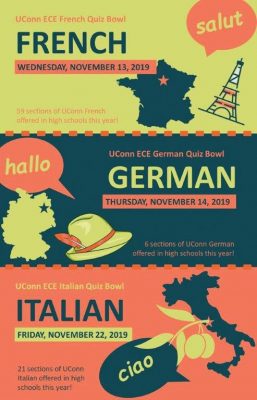
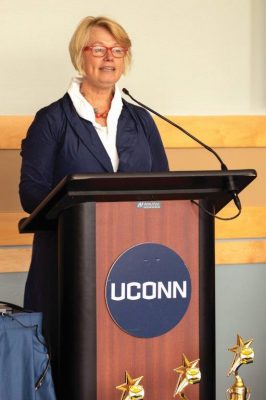
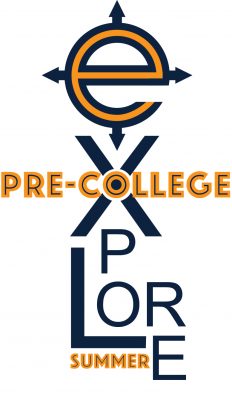 Through supportive and caring faculty members, our students are able to feel a sense of pride and accomplishment while attending Pre-College Summer. This relates to students' readiness to learn in a college setting and the ability to see how their passions may transform into a college major. Dr. Kimberly Bergendahl, Assistant Professor in Residence from the Political Science Department and Pre-College Summer faculty of the Pre-Law course, has had wonderful experiences with Pre-College Summer students, both during and after their time at UConn Pre-College Summer. Dr. Bergendahl has connected with students during their time in the program and is currently working with a former PCS student, now a UConn honors student, studying political science and conducting undergraduate research. This continued collaboration is an example of how our faculty members can foster incredibly transformative learning experiences through the Pre-College Summer Program that help students build connections and guide them toward a path to success.
Through supportive and caring faculty members, our students are able to feel a sense of pride and accomplishment while attending Pre-College Summer. This relates to students' readiness to learn in a college setting and the ability to see how their passions may transform into a college major. Dr. Kimberly Bergendahl, Assistant Professor in Residence from the Political Science Department and Pre-College Summer faculty of the Pre-Law course, has had wonderful experiences with Pre-College Summer students, both during and after their time at UConn Pre-College Summer. Dr. Bergendahl has connected with students during their time in the program and is currently working with a former PCS student, now a UConn honors student, studying political science and conducting undergraduate research. This continued collaboration is an example of how our faculty members can foster incredibly transformative learning experiences through the Pre-College Summer Program that help students build connections and guide them toward a path to success.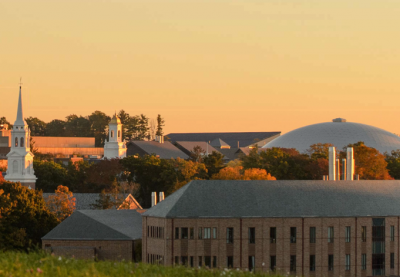 Being a student is an important role and a title that is central to my identity. I love learning and the longer I have been a student, the clearer it becomes that sharing my thoughts and passions on what I read is central to being a great student. We should always be considering and reevaluating our academic passions, as well as sharing our thoughts with important people around us. When I graduated high school I had pretty clear ideas on what I wanted to study but not very clear ideas on how I was going to use it. I loved foreign languages and politics. I was lucky to have studied Russian throughout my four years in high school and was very excited to continue learning Russian and start learning German at UConn. Some people encouraged me to go into international business, because, that's where the money is. Luckily I was surrounded by people who supported my interests and allowed me to focus my passions without monetizing them. It made my studies and self discovery that much more enriching. I did not go into business; rather, I stayed at the interesting crossroads of language, culture, and politics. True to a liberal arts education, my degree prepared me to do a broad array of things because I learned how to analyze and problem-solve and was practiced at applying rigorous methodologies of inquiry. All of these skills have benefited the Office of Early College Programs and allowed me to do interesting things with my life.
Being a student is an important role and a title that is central to my identity. I love learning and the longer I have been a student, the clearer it becomes that sharing my thoughts and passions on what I read is central to being a great student. We should always be considering and reevaluating our academic passions, as well as sharing our thoughts with important people around us. When I graduated high school I had pretty clear ideas on what I wanted to study but not very clear ideas on how I was going to use it. I loved foreign languages and politics. I was lucky to have studied Russian throughout my four years in high school and was very excited to continue learning Russian and start learning German at UConn. Some people encouraged me to go into international business, because, that's where the money is. Luckily I was surrounded by people who supported my interests and allowed me to focus my passions without monetizing them. It made my studies and self discovery that much more enriching. I did not go into business; rather, I stayed at the interesting crossroads of language, culture, and politics. True to a liberal arts education, my degree prepared me to do a broad array of things because I learned how to analyze and problem-solve and was practiced at applying rigorous methodologies of inquiry. All of these skills have benefited the Office of Early College Programs and allowed me to do interesting things with my life.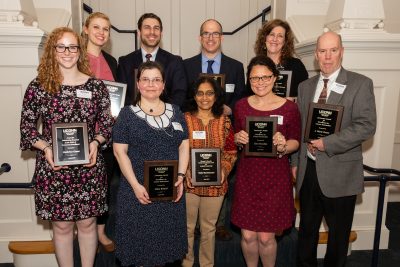 We recognized all award winners at our annual Awards Ceremony in April, presenting them with a plaque and a monetary award over a celebratory dinner with family, friends, and colleagues. It was a night full of admiration and appreciation for the dedication each award winner displays day in and out for their high schools and their students. All award winners have exceeded the program expectations and excelled in preparing their students for the next level in their education.
We recognized all award winners at our annual Awards Ceremony in April, presenting them with a plaque and a monetary award over a celebratory dinner with family, friends, and colleagues. It was a night full of admiration and appreciation for the dedication each award winner displays day in and out for their high schools and their students. All award winners have exceeded the program expectations and excelled in preparing their students for the next level in their education. The April 25th Science Activity Day was coordinated by the UConn Early College Experience Program Office and Dr. Selampinar, with science activities hosted by Dr. Rouge and Dr. Ung and their graduate students (Alyssa H., Saketh G., Mark T., Kaitlynn A., Erin B., Nishya M., and Rebecca F.). To kick off the day's events, the high school students learned about how an interest in chemistry can prepare them for a variety of job paths, including working in a lab as a researcher someday. In the afternoon the students broke into two sections to learn about molecules that can fluorescence and about biomacromolecules that can build structures at the nanoscale. During Dr. Ung's activities, students were taught an overview of the principles of fluorescence and how light interacts with molecules. They made glow sticks and were exposed to scientific thinking. The students were asked to determine why molecules glowed and made simple hypotheses that they verified experimentally. Later, the students gathered and shared the results of their experiments to conclude the relationship between chemical structure and a molecule's ability to glow.
The April 25th Science Activity Day was coordinated by the UConn Early College Experience Program Office and Dr. Selampinar, with science activities hosted by Dr. Rouge and Dr. Ung and their graduate students (Alyssa H., Saketh G., Mark T., Kaitlynn A., Erin B., Nishya M., and Rebecca F.). To kick off the day's events, the high school students learned about how an interest in chemistry can prepare them for a variety of job paths, including working in a lab as a researcher someday. In the afternoon the students broke into two sections to learn about molecules that can fluorescence and about biomacromolecules that can build structures at the nanoscale. During Dr. Ung's activities, students were taught an overview of the principles of fluorescence and how light interacts with molecules. They made glow sticks and were exposed to scientific thinking. The students were asked to determine why molecules glowed and made simple hypotheses that they verified experimentally. Later, the students gathered and shared the results of their experiments to conclude the relationship between chemical structure and a molecule's ability to glow.